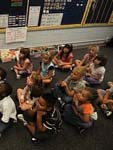







Introduction What About Freire? The Pink Monkey Psst! Wanna Buy A...? And His Pants Are Ugly Conclusions Opinions References and Credits |
Who Owns School?
addresses the problem of meaningful school experiences—or, for many
students, the lack thereof. Arguing that students have become
increasingly disconnected from institutionally-sanctioned learning,
Ritter presents analyses of particular web sites—sites of
extra-institutional academic discourse, if you will—that show how
students have responded to this disconnect. The Internet, Ritter
claims, has made it possible for students to create their own
educational experiences by engaging in non-teacher mediated
conversations; it has also complicated traditional definitions of
literacy. The reasons for students’ turn to the Internet? My anecdote about the green-light-at-the-end-of-the-dock assignmentis intended partly to illustrate a problem Ritter describes at length in her introduction, “School for Sale”: students are seeking a voice in their education that they cannot find within a self-replicating system. (Perhaps the most disheartening—while encouraging to me—aspects of my FYC students’ educational narratives is the fact that they keep talking about how what they found so pleasant, and unusual, about my course was the fact that they could choose their own topics to write about.) In School World (my term, not Ritter’s), individual teachers keep giving the same assignments over and over again not because they’re lazy, necessarily, but because our educational system not only encourages but requires—particularly in this age of standardized testing—uniformity. Ritter: “Students do assigned work individually, or occasionally in small- and in large-group settings….Classes are divided by subject areas of the curriculum, with little overlap from one course to another, or between potentially conversant subjects. “ Most importantly, "[s]tudents play a limited role in the scope or direction of the course, and fulfill a series of required assignments and sequences of courses in order to meet state and local mandates. Teachers are in charge of students. Administrators are in charge of teachers" (p. 5). And texts? As Johnny Depp so memorably said in Donnie Brasco, "fuggedahboudit." Texts—chosen, ultimately, by administrators—are taught by teachers who are evaluated on the basis of how successful students are at completing the assignments connected with those texts. Such a system leaves very little room for personal engagement or innovation. Textual analysis is one, but not the only, aspect of education students have taken online in an attempt to reclaim it. In Who Owns School?, Ritter also explores sites such as Rate My Professor which allow students to evaluate teaching in an atmosphere free of teacher/administrator oversight, and online paper mills that force those of us who are teachers to confront what we, as cogs in the educational machine, may or may not have taught our students about authorship. |